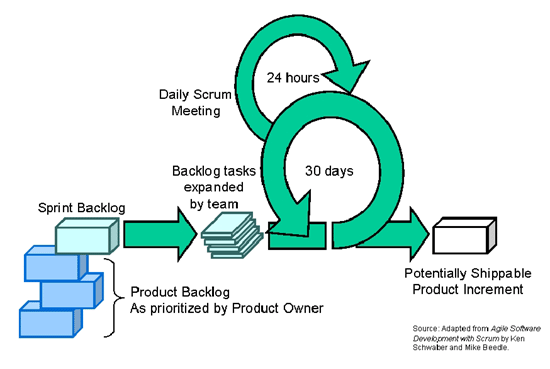I moved to a new job recently, which applies agile methodologies to manage software teams, particularly Scrum, which was adopted to make an effective management of price, estimates, task and resources. It’s my first experience working with an agile process and I’m no doubt it brings a lot of values for a software project.
The Scrum methodology works something like this:

The team works on iterations (called sprints) during from 2 to 4 weeks (it depends on the project, organization..) on features prioritized by the owner(s) and the Scrum master of the project referring to a list of requirements written on a document (called product backlog). The priority is set according to the business value of the feature. The called owner is a representation of the customer. The Scrum master is the person who removes impediments for the team to keep them focused on the tasks and keeps the focus on the sprint goal. More information you can find here.
Every sprint start we estimate some stories and select the work to be done on the current sprint. At the end of the sprint, we have the review and restrospective of was and wasn’t done.
Above are my opinions about this agile methodology working with for a month:
- The team is completely committed to the overall goal of the sprint
- Members try to help each other as soon as one poses an impediment
- Everyone on the team knows which task the others are doing
- Every member helps each other to complete their tasks when they finish their ones
- The Scrum Master is always there to remove obstacles, clarify the understanding of the stories and help the estimates
- The PO acts with the team to give directions and suggestions for the next stepsand how to interact with other areas on the organization
I’m very motivated with Scrum practices and the way we put it in practice, and I know I have to learn a lot more.
Have you ever worked with Scrum? What do you think about this agile methodology?